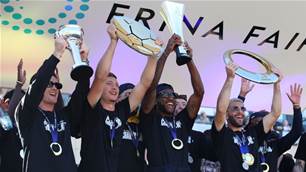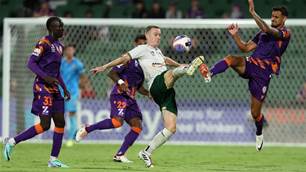There are three certainties in life: death, taxes and mistakes by referees.
We know this.
We hate it, but we grudgingly accept it, the same way we accept the weather, mosquitos and reality TV.
I can remember any number of referee howlers from my own playing days. One particular doozy was a few years ago playing in the Central Coast Over 45s comp. My team just needed a draw to make the semis and with minutes to go it was still 0 – 0. One of their chaps tried to get in behind me (playing right back) and in so doing pushed the ball a good two feet over the goal line. It was so far out that we all just stopped, but the enemy winger kept going, and to our horror we realised the ref was going to let him. A goal was duly scored and as we started protesting bitterly, it was noted that the linesman had his flag in the air.
Phew!
But wait, the ref ignored the linesman and blew a goal anyway, and what followed was truly bizarre. The linesman stormed off in protest, and at the end of the game we learned he was none other than the President of the Referees’ Association!
Anyway, we lost 1 – 0 and missed the semis (replaced by the team that had beaten us). Was there anything that could be done? Surely the result could be overturned when the mistake was so bad, with impact so unjust and with the most eminent possible witness!
No, nothing could be done, we were told. There’s no changing the referee’s decision, no matter how obviously wrong, so that was the end of the matter – which we accepted with gritted teeth and resumed…I mean started drinking beer.
After all, referees are a critically important part of the game. There wouldn’t be a game without them, so it is only right that FIFA enshrine among their laws that the referee’s decision has to be respected, even when blatantly wrong, and cannot be overturned under any circumstances.
I really want to emphasise that. FIFA say that the referee’s decision can never, never, never be overturned. I mean, if FIFA didn’t even make an exception to the rule when Maradona scored against England in the 1986 World Cup, or Thierry Henry’s outrageous handball got France into the World Cup at the expense of Ireland, costing the Irish FA millions of pounds, then surely no-one else could possibly have the authority to change the ref’s decision, right?
Wrong.
The Central Coast Football Association has the power to overturn referee’s decisions days after full time, and that’s exactly what happened a couple of weeks ago in the Division 1 men’s grand final contested by Umina Eagles and Woongarrah Wildcats.
The facts are not in dispute. If Woongarrah Wildcats scored from the tenth kick of a penalty shootout, they would be crowned champions. The ball hit the crossbar, bounced back and hit the diving goalkeeper, then went into the goal.

The referee erroneously ruled no goal, and the shootout continued until Umina were declared the winner.
This was wrong.
Everyone agrees that this was totally wrong.
However, the referee, whose decisions must be respected even when wrong according to FIFA, said it was right.
Game over.
Umina celebrated, as they had every right to do. They’d been declared the winners by the referee and, even if some of them knew the referee had made a mistake, how was this any different to the millions of other mistakes made by officials all the time that potentially change the destiny of a match, season, career?
A penalty not given…a penalty wrongly given…a ball crossing the line for a goal not given…a goal wrongly allowed or disallowed for offside…
These happen every game. We’re used to it and we get on with it.
However, Woongarrah, after consulting with the CEO of Central Coast Football, lodged an appeal. The consideration of their appeal was predicated on an incident report subsequently provided by the referee, and also some iPhone footage provided by fans.
The appeal was upheld by the association and Woongarrah were declared the winners.
I am not remotely suggesting that anyone has done anything wrong. In particular, no-one is blaming the referee. Mistakes happen and we all move on.
Whatever happened to overturn the result was done, I suspect, in the interests of a desire to be fair. The thing is, as far as I can see, notwithstanding the altruistic motivation of the association, the authority to overturn the result has to be questionable.
The Umina club appealed against the decision to overturn and the matter was referred to an independent arbiter who considered the three technical grounds of appeal and determined that, while there was much merit in Umina’s argument, none of the grounds of appeal were sufficient to upset the determination of Central Coast Football.

The key finding of the arbiter concerned the FIFA laws which state at Rule 5:
1. The authority of the referee
Each match is controlled by a referee who has full authority to enforce the Laws of the Game in connection with the match.
2. Decisions of the referee
Decisions will be made to the best of the referee`s ability according to the Laws of the Game and the ‘spirit of the game’ and will be based on the opinion of the referee who has the discretion to take appropriate action within the framework of the Laws of the Game.
The decisions of the referee regarding facts connected with play, including whether or not a goal is scored and the result of the match, are final. The decisions of the referee, and all other match officials, must always be respected.
The referee may not change a decision on realising that it is incorrect or on the advice of another match official if play has restarted or the referee has signalled the end of the first or second half (including extra time) and left the field of play or terminated the match.
On a plain English reading of these laws there was no possible ground to upset the original result, despite it having been determined by error. However, the arbiter found that the local provisions of the Central Coast Association allow for the possibility that the apparently absolute flavour of the FIFA rules is subject to local amendment. The only example the arbiter gave for such departure from the plain language of the FIFA laws concerned disciplinary decisions, which to my mind are vastly different in character from game determining decisions (like whether a ball crossed the line) and intended to cater for indiscretions not picked up by the referee (normally in FIFA sanctioned tournaments televised and recorded by partners subject to very specific rules regarding that recording for disciplinary review).
It is also very interesting that the arbiter referred to the unofficial footage received by the association as part of the Woongarrah appeal. What exactly was the standing of that footage and where was the authority under the local rules to consider amateur footage generated outside the usual (highly prescriptive) FIFA provisions?
Ultimately, these are quibbling details.
It is difficult to argue with any great conviction that the final result is wrong, and yet…
Umina were extremely disappointed with the decision but they declined their opportunity for further appeal for a number of reasons. Most importantly, they didn’t want any further scrutiny of the referee who, despite his error, was acting in good faith and is regarded as a highly talented up and comer.
Next, they didn’t want to be party to an emerging culture of appeal. Do we really want to encourage a culture where every game is filmed with the potential for overturning Premier League Grand Finals…All Age semis…Over 45 comp matches…under 9s pre-season matches?
Where does it end and where, quite frankly, is the authority for the appeal in the first place?
The Umina Club, and most football fans everywhere, would surely agree that the referee’s decision must always be final, no matter how wrong. Referees suffer from a lack of respect as it is and if every decision can become the subject of appeal supported by iPhone evidence in the court of facebook, who on earth will ever want to become a ref?
No-one wins in this sad story, but I for one would recommend that Central Coast Football have a close look at their local regulations regarding overturning a referee’s decision and ask themselves: is that really what they meant?
If yes, then maybe there’s still time to replay that O45’s match and my team can still make the semis for 2013!
---------
Adrian’s latest book Political Football: Lawrie McKinna’s Dangerous Truth is in the shops right now or available through Booktopia. Adrian also wrote Mr Cleansheets.
Related Articles

A-League clubs in peril as APL prepares to wield financial axe

Wanted Monty puts Hibernian hurt behind him amid offers from Asia and Europe













